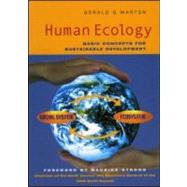Human Ecology
, by Marten, Gerald G.- ISBN: 9781853837142 | 1853837148
- Cover: Paperback
- Copyright: 11/1/2001
* Clear, accessible and illuminating introduction to the fundamental concepts and issues of sustainable development * Ideal introductory course book for a wide range of courses in environmental sciences, social sciences, geography and ecology * Contains extensive examples, case studies and includes exercises "This book is a valuable step toward making human ecology a subject that everyone can and should understand. Its scope and clarity make it accessible and informative to a wide readership. It provides a clear and comprehensible account of concepts that can be applied in our individual and collective lives to pursue the promising and secure future to which we all aspire." -- Maurice Strong, Chairman of the Earth Council and Secretary General of the 1992 Earth Summit Human ecology is the study of how human social systems relate to and interact with the ecological systems on which they depend. As the study of how to achieve ecologically sustainable development becomes more and more important in courses in human and natural sciences, it is becoming a fundamental introductory subject. "Human Ecology" is the first introductory textbook of its kind. It provides a comprehensive, clear and engaging introduction designed to meet student and teaching needs. It explains how ecosystems are organized and function; the interactions of human social systems with them; and how social institutions and processes contribute to or conflict with sustainability. It integrates long-standing ecological principles with more recent concepts from complex systems theory. Simple diagrams, examples and exercises make the concepts easily understood. It should become the standard text in the area.







